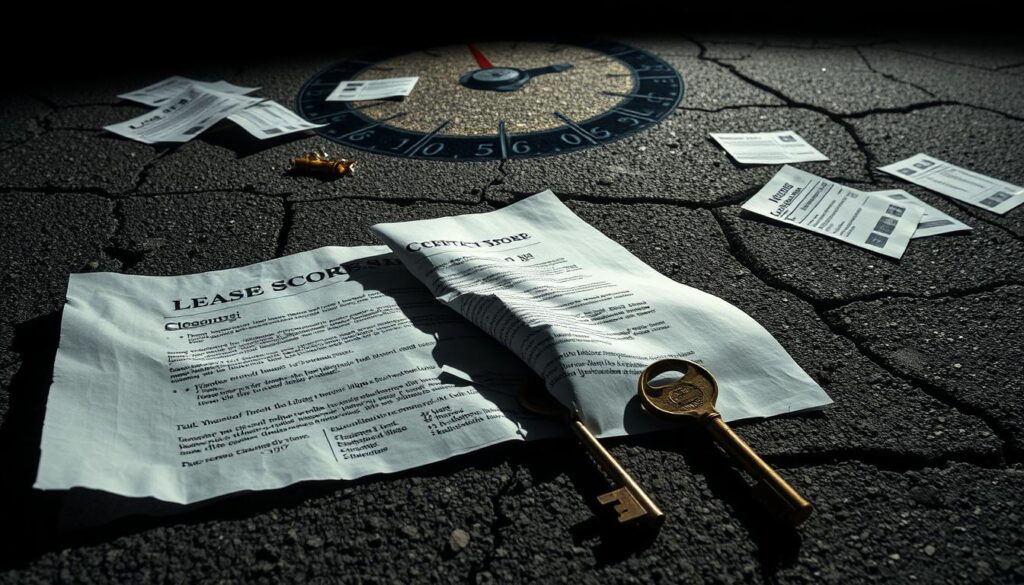Breaking a lease can harm your credit score and financial health. Ending a rental agreement early may impact your credit history and report. Let’s explore how breaking a lease affects your credit and ways to minimize potential damage.
We’ll look at short-term and long-term effects on your credit. We’ll also discuss strategies to protect your credit score when ending a lease early.
Key Takeaways
- Breaking a lease can negatively impact your credit score, especially in the short-term.
- Landlords may report lease violations and unpaid rent to credit bureaus, which can remain on your credit report for up to seven years.
- The long-term consequences of a broken lease may include difficulty securing future rental agreements or obtaining loans and credit cards.
- Proper documentation, negotiation with landlords, and understanding your rights as a tenant can help mitigate the credit score impact of breaking a lease.
- Proactive strategies, such as reading the fine print and financial planning, can help you avoid future lease breaches and protect your credit history.
Understanding Lease Agreements and Their Implications
Lease agreements are vital for tenants and landlords. They come in various types, each with unique terms. Knowing these details helps you make smart choices and avoid problems.
Types of Lease Agreements
Lease agreements have different forms. Here are some common types:
- Fixed-Term Leases: These agreements have a predetermined end date, providing stability for both the tenant and the landlord.
- Periodic Leases: Also known as “month-to-month” leases, these arrangements allow for more flexibility, with either party able to terminate the contract with a specific notice period.
- Sublease Agreements: In this scenario, the original tenant (sublessor) rents the property to a third party (sublessee), while still maintaining the primary lease contract with the landlord.
Legal Obligations and Consequences
Both tenants and landlords have legal duties in lease agreements. Not following these can lead to serious lease termination consequences. These may include fines, credit score damage, and legal trouble.
Tenants must pay rent on time and keep the property in good shape. They should also follow any rules in the lease. Landlords must ensure the property is livable and fix necessary repairs.
Knowing tenant legal obligations and lease agreement types helps you handle leases better. It can also help you avoid unwanted issues.
Common Reasons for Breaking a Lease
Tenants sometimes need to terminate their lease prematurely. This section covers common reasons to break lease and early lease termination scenarios. These include job relocation, financial hardship, and personal circumstances.
Job relocation is a primary reason to break lease. When work requires a move to a new city or state, tenants may need to break the lease. This often affects professionals in various industries, including corporate executives and military personnel.
Financial hardship is another common cause for early lease termination. Unexpected job loss, reduced income, or increased expenses can make it hard to fulfill lease terms. Breaking the lease may be the only option to avoid further money problems.
Personal circumstances can also lead to terminating a lease early. Family emergencies, health issues, or changes in living situations may force tenants to move. These unexpected events can disrupt original plans and require breaking a lease.
Tenants should review their lease agreements before taking action. Understanding rights and obligations helps make informed decisions. This can lessen the impact on credit and financial health when considering early lease termination.

Does Breaking a Lease Hurt Credit
Breaking a lease can impact your credit score and financial health. It may affect your ability to rent or borrow in the future. Let’s explore the short-term and long-term consequences of ending a rental agreement early.
Short-Term Credit Impact
Your landlord might report an early lease termination to credit bureaus. This can lead to a temporary drop in your credit score. As a result, you may struggle to get new loans or credit cards.
Securing future rental agreements could also become more challenging. Landlords may be wary of tenants with a history of breaking leases.
Long-Term Credit Consequences
A broken lease can stay on your credit report for up to seven years. This long-lasting mark may hinder your financial goals and opportunities.
Future landlords might hesitate to rent to you. Lenders may see you as a higher-risk borrower and offer less favorable terms.
| Potential Impacts | Short-Term | Long-Term |
|---|---|---|
| Credit Score | Temporary drop | Lasting damage |
| Loan Eligibility | Difficulty qualifying | Higher interest rates |
| Future Rental Opportunities | Landlord hesitation | Restricted options |
Breaking a lease can significantly affect your credit and financial future. Consider the potential consequences carefully before making this important decision.
Rental Lease Termination and Credit Score Impact
Ending a rental lease can affect your credit score. Credit bureaus often receive reports about lease terminations. Your creditworthiness may change depending on how you end your lease.
Breaking a lease can hurt your credit score. The landlord might report it to credit agencies. Several factors influence the impact on your score.
- The reason for the lease termination
- The timing of the termination (e.g., early vs. end of lease)
- Whether you fulfilled your financial obligations prior to termination
- The landlord’s reporting practices and policies
A rental lease termination can seriously harm your credit score. This happens if you breach the contract or leave unpaid rent. Mutually agreed terminations usually have less impact.
| Scenario | Credit Score Impact |
|---|---|
| Early lease termination with outstanding rent | Significant negative impact |
| Early lease termination with no outstanding obligations | Moderate negative impact |
| Lease termination at the end of the term | Minimal or no impact |
Know how ending your lease affects your credit score. Take steps to lessen the impact. Try negotiating with your landlord. Dispute any wrong information with credit bureaus.
Early Lease Termination and Credit History Effects
Breaking a lease can hurt your credit history. Early termination details may be reported to credit bureaus. This can lower your credit score and impact your financial future.
Reporting to Credit Bureaus
Landlords often report lease violations to Experian, Equifax, and TransUnion. This information stays on your credit report for up to 7 years. It can make getting housing and loans harder.
- Early lease termination is often reported as a breach of contract on your credit history.
- This can lead to lower credit scores, as it signals to lenders that you may not be a reliable borrower.
- The impact on your credit history can be long-lasting, making it challenging to rebuild your creditworthiness.
Understanding your lease agreement is crucial before breaking it. Talk to your landlord and keep good records. These steps can help reduce negative effects on your credit history.
“The information about a broken lease can be reported to credit bureaus, which can have a significant impact on your credit history and score.”
| Credit Bureau | Reporting of Lease Termination |
|---|---|
| Experian | May report early lease termination as a delinquent account or collection item |
| Equifax | Can include early lease termination in the “Public Records” section of your credit report |
| TransUnion | May record early lease termination as a “Rental History” item on your credit report |
Lease Violation Consequences on Credit Reports
Landlords may report lease violations to credit bureaus when tenants break leases. This can harm a tenant’s credit report and score. Such actions may affect future housing, loans, and financial opportunities.
Broken Lease Fees and Charges
Breaking a lease can lead to various fees and charges. These may include early termination fees, unpaid rent, and new tenant search costs.
Landlords can report these charges to credit bureaus as delinquent accounts or collections. This reporting negatively impacts the tenant’s credit report and score.
| Type of Charge | Impact on Credit Report |
|---|---|
| Early Termination Fee | Reported as a delinquent account or collection |
| Unpaid Rent | Reported as a delinquent account or collection |
| Cost of Finding a New Tenant | Reported as a delinquent account or collection |
Credit report entries can vary based on landlord reporting and tenant resolution efforts. The impact depends on how these factors play out.

Tenants should know how breaking a lease affects their credit. Lease violation consequences and credit report entries can have long-lasting effects. Broken lease fees may impact a tenant’s financial future significantly.
Tenant Rights and Landlord-Tenant Disputes
Renters must know their legal protections in tenant rights and landlord-tenant disputes. These rights apply even when a lease ends. Tenants deserve respect for their legal safeguards.
A key right is a livable home. Landlords must keep properties safe and habitable. They can’t evict tenants without legal reasons.
Tenants have rights to privacy and freedom from harassment. They can act on their rights without fear of retaliation.
There are set ways to solve landlord-tenant disputes. Tenants may withhold rent if landlords neglect duties. They might end leases early in some cases.
Landlords can evict for unpaid rent or lease violations. Both parties have legal options in disputes.
- Tenants have the right to a habitable living space, privacy, and freedom from harassment.
- Landlords are responsible for maintaining the property and cannot evict a tenant without proper legal grounds.
- Landlord-tenant disputes can be resolved through established legal processes, such as rent withholding or early lease termination.
Knowing tenant rights helps navigate broken lease issues. Understanding dispute resolution is key for both tenants and landlords.
Mitigating Factors for Credit Score Protection
Breaking a lease can hurt your credit score. But you can take steps to lessen the damage. Negotiate with your landlord and document everything to protect your credit.
Negotiating with Landlords
Talk to your landlord to reduce the impact on your credit score. Try to reach an agreement for a smaller penalty or a clean exit.
Landlords may be open to working with you. This is especially true if you’ve been a good tenant and have a valid reason to leave.
Proper Documentation
- Carefully review your lease agreement and understand your rights and responsibilities as a tenant.
- Document all communication with your landlord, including any negotiations or agreements made.
- Obtain written confirmation from your landlord that the lease termination will not be reported to credit bureaus, if possible.
- Ensure that you provide proper notice to your landlord as outlined in your lease agreement.
- Keep copies of all relevant documentation, such as the lease agreement, rent receipts, and any correspondence with the landlord.
Take these steps to mitigate credit score impact and negotiate with landlords. Keep proper documentation throughout the process. This can greatly reduce the negative effects on your credit report.

Strategies for Breaking a Lease Without Damaging Credit
Need to end your lease early? Don’t worry. There are ways to do it without hurting your credit score. With the right approach, you can protect your financial future.
Negotiate with your landlord. They might let you break the lease penalty-free or transfer it to someone else. Open talks and a positive attitude can lead to a good outcome.
Back up your reasons with proper documentation. This could be medical records, job transfer papers, or proof of money troubles. Good evidence can help avoid penalties and bad credit reports.
- Negotiate with your landlord to find a mutually agreeable solution
- Gather and present relevant documentation to support your reasons for breaking the lease
- Explore options for transferring the lease to a new tenant
- Seek legal advice if necessary to understand your rights and obligations
Smart planning can help you break a lease without harming your credit. Use these tips to keep your credit strong. Your future self will thank you.
Credit Repair Options After a Broken Lease
A broken lease can hurt your credit. But there are ways to fix the damage. One effective method is disputing wrong information on your credit report.
Disputing Inaccurate Information
Landlords may report broken leases to credit bureaus. This can lower your credit score. But you can dispute any incorrect or incomplete information.
Here’s how to dispute wrong credit report entries:
- Check your credit report for errors about the broken lease.
- Collect supporting documents like lease agreements and payment proofs.
- Contact credit bureaus and submit a dispute with evidence.
- Follow up to ensure they process your dispute.
Successfully disputing wrong information helps credit repair after broken lease. It can protect your credit score too.
| Credit Bureau | Dispute Process |
|---|---|
| Experian | Online, by mail, or by phone |
| Equifax | Online, by mail, or by phone |
| TransUnion | Online, by mail, or by phone |
Be persistent when disputing inaccurate information on your credit report. Keep good records. These steps can help repair your credit after a broken lease.

Avoiding Future Lease Breaches
Careful consideration is vital when entering rental agreements. Read and understand your lease’s fine print. Practice responsible financial planning to prevent future terminations and credit impacts.
Reading the Fine Print
Review the contract thoroughly before signing. Focus on clauses outlining your obligations and consequences of breaking the agreement. This understanding helps avoid unintentional lease breaches later.
- Familiarize yourself with the lease termination policies and early-exit fees.
- Identify any restrictions or limitations on subletting or assignment of the lease.
- Understand the landlord’s rights and your responsibilities regarding property maintenance and repairs.
Financial Planning
Responsible financial planning ensures you can meet lease obligations. Budget carefully and anticipate potential changes in your financial situation. This approach minimizes the risk of future lease breaches.
- Assess your current and projected income, expenses, and savings to ensure you can comfortably afford the monthly rent.
- Factor in potential life events, such as job changes or unexpected expenses, that could impact your ability to make rental payments on time.
- Explore options like emergency savings or backup financial resources to help you weather any unexpected financial challenges.
Reading the fine print and planning finances prevents future lease breaches. These actions maintain a healthy credit profile. Taking proactive steps saves you from stress and consequences.
These measures help you avoid future lease breaches and maintain good credit. Your diligence now can prevent problems later.
Conclusion
Breaking a lease can significantly impact your credit score and finances. It’s crucial to know your lease terms and legal duties. Be cautious when thinking about ending your lease early.
Breaking a lease may affect your credit short-term and long-term. Negotiate with landlords and keep proper records. Use strategies to lessen the damage to your credit score.
Your credit score plays a vital role in your financial life. Protect it as much as you can. Understand the effects of breaking a lease and take proper action.
By doing so, you can reduce the impact on your credit. This will help you maintain a healthy financial position.

